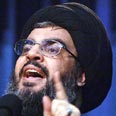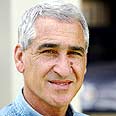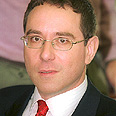

Nasrallah
Photo: AP

Professor Mishal
Photo: Michael Kramer

Prof. Eyal Zisser
Photo: Zoom 77
Nasrallah holds the cards again
Why did Hizbullah attack now? According to Mideast expert Prof. Mashal, ‘Nasrallah was afraid of becoming marginal player due to Palestinian-Israeli coordination efforts, and decided to claim center stage.’ Prof. Zisser isn’t sure Nasrallah’s gamble will work. In any case, both support heavy hand against the terror group
News anchors on Hizbullah TV station el-Manar found it difficult to hide their satisfaction with Wednesday’s events in Lebanon.
The TV station presented photos of militants jailed in Israel, namely Samir Quntar, who has been imprisoned for the last 28 years.
The brother of Yehiya Skaf, another prisoner, shouted on the air “Allah Akbar! Thank you Hizbullah; long live Secretary General Hassan Nasrallah.”
Hizbullah has utilized the airwaves to advance its main goal: A future prisoner exchange deal with Israel.
The kidnapping came as no surprise to the security establishment officials, so much so that two weeks ago, when Nasrallah delivered a televised speech, they were glued to the screen in an effort to pick up any clues regarding Hizbullah’s next operation, but to no avail.
“Nasrallah, who is known for his strategic analysis capabilities, has reclaimed his central role, and if I were the prime minister – I would want such a defense minister,” Hamas expert Prof. Shaul Mishal told Ynet.
“Nasrallah looked at the Gilad Shalit kidnapping affair from the outside and noticed that instead of resistance and violence there are talks of a possible Hudna (temporary ceasefire) between Israel and the Palestinians and international mediation, and all this with the involvement of Russia, the US, Turkey and other countries; he was afraid of turning into a lone wolf overnight,” Mishal said.
“If an atmosphere fostering reconciliation and agreements would have been created here – his influence would have diminished; he chose to take things into his own hands and cause the continued bleeding of the Palestinian-Israeli conflict.”
'Gambles aren’t always successful'
Head of the Department for Middle Eastern and African Studies at Tel Aviv University, Professor Eyal Zisser believes that secretary general of Hizbullah is trying to take advantage of the situation: “Nasrallah succeeded in exploiting the opportunity that he encountered to once again claim a central role in affairs. Despite that, it is a gamble, and the nature of gambles is that they are not always successful. Up until now, Hizbullah's significance was that it operated in a gray area – when on the one hand they told the Lebanese they wouldn’t be harmed and that their targets were legitimate, but on the other hand they made Israel not harm Lebanon. Now, if it turns out that they’ve taken one step too far and are harmed by Israel – his (Nasrallah’s) organization may pay a price.”
At the time these lines were written, Nasrallah had not yet made a public appearance. It was reasonable to assume that such an appearance is imminent and will obey the rules of ceremoniousness: Excited cries of joy, an enthusiastic support rally and an euphoric and boastful victory speech by those who once again humiliated Israel. But in the end, what will he want?”
“Nasrallah will try to be the one responsible for negotiations and will try to combine the two kidnappings into one event,” Professor Mishal said. “It can be purported that he will demand the freeing of thousands of soldiers, including Lebanese prisoners, Jordanians and Palestinians and to leverage the whole process to improve his standing in the Lebanese political system. Now he seems like the mover and shaker of Tehran and Damascus against Israel, and as a main player regionally, not just against Israel but facing Hamas as well. The kidnapping gave him back his regional standing, which in my opinion is higher than that of the country’s leader. After (former Syrian President) Hafez Assad left, he is the most efficient leader today and has unrivaled stature. He showed everyone how, with only 600 fighters, you can have a balance of intimidation against a full-size army. There is no doubt that lessons can be learned from him on this matter.”
“Nasrallah will definitely want the release of the remaining Lebanese prisoners, and others too. In any case, if he gets Samir Quntar, all the rest won’t really matter in his view because Samir Quntar is a symbol,” Professor Zisser noted.
How did Hamas take the news?
Professor Mishal noted, “The Hamas government in the territories is cursing him to no end. The Hamas government was dealt a blow which made us all – Israel, (Palestinian President) Mahmoud Abbas, and (PA Prime Minister Ismail) Haniyeh – into allies in the same camp that took part in diplomatic talks surrounding the kidnapping issue. The discussion route showed no promise, while the route of armed struggle was surprising in its strength.”
In the recent crises between Israel and Hizbullah, Lebanese Prime Minister Fuad Siniora made sure to communicate to Israel his request that they act with restraint. In Israel, the decision was frequently made to acquiesce to his requests, possibly out of the desire to help him establish his leadership against Hizbullah. In Israel, there were also those who held onto Siniora’s proclamations, as well as those by Druze leader Walid Jumblatt, regarding the need to disarm Hizbullah, but all the while it was clear that in the foreseeable future no one would really lay a hand on Nasrallah’s weapons. All of this considered, should Israel respond this time too, and what should it do?
Professor Zisser says, “ As long as Israel doesn’t exact payment from Lebanon – Nasrallah won’t be harmed and won’t pay a personal price. If Lebanon is hit, they will go to Nasrallah with their complaints. As soon as the shooting stops, it is reasonable to assume that we’ll wait months or even years until the time is right for negotiations, but now Israel can retaliate. In any case, I would recommend at the first stage to exact a price from Lebanon, maybe even a minimal one, such as an aerial curfew over all of Lebanon. It unfortunately won’t bring the soldiers back, but it will be a severe enough message. In a more inclusive view, Israel needs to decide if it will take revenge or carry out a root treatment – knowing that each choice has its price.”
Professor Mishal also supported a harsh response to Hizbullah. “I would make sure to distinguish between the two channels – the Palestinian and the Lebanese. In the face of the Palestinians, I would continue talks in attempt to reach a solution to the kidnapping crisis, but towards Hizbullah, I would continue the fighting. Nasrallah would like to have both issues grouped together, and if he succeeds in uniting both events into one negotiation process – Israel will be the loser on both planes, and therefore we must make sure to play on both fields separately and respond to Hizbullah with a heavy hand.”















